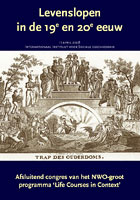|
Levenslopen in de 19e en 20e eeuw
Afsluitend congres van het NWO-groot programma 'Life Courses in Context'
Introductie
 Op vrijdag 11 april 2008 vindt op het Internationaal Instituut voor Sociale Geschiedenis (IISG) te Amsterdam het afsluitende congres plaats van het NWO-Groot programma 'Life Courses in Context'. Met behulp van dit programma is de afgelopen vijf jaar gewerkt aan de reconstructie van de levensloop van 40.000 Nederlanders die werden geboren tussen 1863 en 1922. Deze database op individueel niveau werd aangevuld met macrodata afkomstig uit de beroeps- en volkstellingen uit de periode 1859 en 1947.
Op vrijdag 11 april 2008 vindt op het Internationaal Instituut voor Sociale Geschiedenis (IISG) te Amsterdam het afsluitende congres plaats van het NWO-Groot programma 'Life Courses in Context'. Met behulp van dit programma is de afgelopen vijf jaar gewerkt aan de reconstructie van de levensloop van 40.000 Nederlanders die werden geboren tussen 1863 en 1922. Deze database op individueel niveau werd aangevuld met macrodata afkomstig uit de beroeps- en volkstellingen uit de periode 1859 en 1947.
Een klein deel van de mogelijkheden van deze nieuwe infrastructuur voor de Nederlandse sociale, demografische en economische geschiedenis zal op dit congres worden gepresenteerd. Historici, demografen en sociologen gebruikten de nieuwe data om interessante vragen te beantwoorden over levenslopen van de Nederlandse bevolking in de 19e en 20e eeuw.
Als dagvoorzitter zal optreden prof. dr Harry Ganzeboom, hoogleraar sociale wetenschappen aan de Vrije Universiteit en voorzitter van de stichting Historische Steekproef Nederlandse bevolking (HSN).
De kosten voor deelname aan dit congres bedragen € 15,- , inclusief lunch.
Aanmelding door overmaking op rekeningnummer 41.13.90.805 tnv IISG Amsterdam, onder vermelding van 'HSN congres 11 april'
Voor inlichtingen en aanmeldingen kunt u contact opnemen met Astrid Verburg, Internationaal Instituut voor Sociale Geschiedenis (email: ).
Life Courses in the 19th and 20th Century
Concluding congress of the NW0-Groot program 'Life courses in context'
Introduction
The concluding congress of the NWO-Groot program 'Life Courses in context' will take place on Friday April 11th, 2008. The meeting will be held at the International Institute of Social History (IISH) in Amsterdam. Funded by NWO-Groot, the last five years attempts have been made to reconstruct the life courses of about 40,000 Dutchmen born between 1863 and 1922. Data on aggregated level from 1859-1947, like population censuses and counts of labor force, were added to these data on individual level.
At this congress a small part of the possibilities of this new infrastructure for Dutch social, demographic and economic history will be presented. Historians as well as demographers and sociologists used the new data to answer interesting questions about life courses of the Dutch population during the 19th and 20th century.
Chair will be dr. Harry B.G. Ganzeboom, Professor of Sociology and Social Research Methodology at the Free University of Amsterdam (VUA) and president of the foundation Historical Sample of the Netherlands.
Top
|

